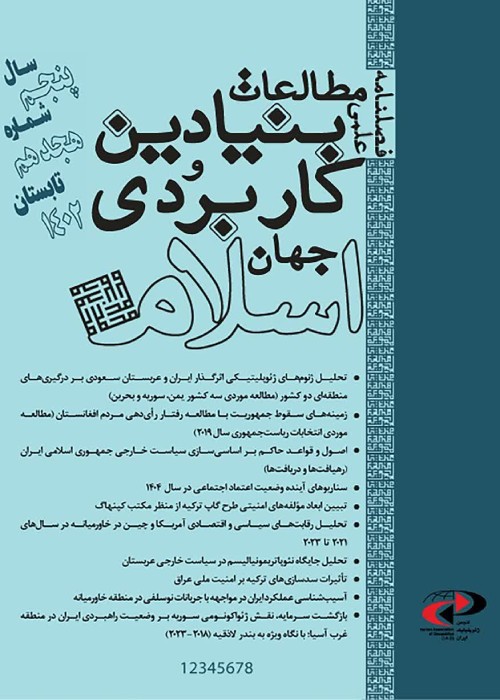The PGCC's Security Strategy towards Iran (2011-2018)
The relations between Iran and the Persian Gulf Cooperation Council countries have had many ups and downs since the foundation of this council in 1981. One of the primary purposes of the PGCC was the confrontation with the Islamic revolution and its ideology. This trend has been strengthening by the expansion of Iran's regional power and its missile and nuclear capabilities. With the beginning of uprisings in the Middle East and North Africa in 2011 and the following expansion of regional competitions, the examination of the PGCC approach toward these developments and its reaction to Iran and the Axis of Resistance as Iran's strategic depth seems noteworthy. Accordingly, the present paper attempts at answering this question: Which security strategy has been followed by the PGCC toward Iran since the Islamic Awakening?
A review of the existing literature on relations between Iran and the PGCC and their pattern of reaction to the security agendas of the other side shows that despite the existence of many publications and papers in this field (Sadeghi and Naqdi, 2014; Shirazi and Niko, 2014), the issue of the Security Council's security strategy on Iran has so far not been considered from a theoretical or analytical perspective. Some of these papers have even restricted this relationship to the dynamics of Iran and Saudi Arabia (Abuelghanam and Tahboub, 2018; Veisi, 2018; Koushki and Hoseini, 2015). In this regard, it is possible to refer to studies which have examined the relations between Iran and Saudi Arabia in the form of an aggressive realism approach (Mahdian and et al., 2016).
The paper's methodology is an analytical-descriptive approach, and the authors adopt offensive realism as their theoretical framework. Library resources and other content sources, such as articles and dissertations, are used as the main sources of this research.
With the US invasion of Iraq in 2003, the signs of a shift in Iran's regional power equation gradually became apparent. Accordingly, the monarchies (members of the Cooperation Council) saw Iran's growth in nuclear, military, and regional power as a serious threat to their very existence and survival. In response to such development, balancing was used as one of the main components of the Security Council's strategy toward the Islamic Republic of Iran.The escalation of the unrest in the Middle East as a result of the Islamic Awakening coincided with the Council's uncertainty about Iran's intentions (especially Iran's nuclear capability, missile program and regional policy) and its positive assessment of the capabilities of its rulers. Iran's aggression (economic power, military equipment and capabilities, and its political potential to form a coalition led to the aggressive behavior of the Cooperation Council.
At the heart of the PGCC's policies and strategies is their attempts to prevent Iran from becoming a regional hegemony. In line with Trump's strategy for the securitization of Iran's regional policy and managing the Palestinian conflict through the unilateral plan of the century deal, Axis of Arab ties with US plans have expanded.The PGCC, especially Saudi Arabia's Bandwagon Front in the council, has adopted an offensive approach toward Iran and used direct and proxy wars, building of international and regional alliances, and balancing and transferring responsibility to determine their purposes
- حق عضویت دریافتی صرف حمایت از نشریات عضو و نگهداری، تکمیل و توسعه مگیران میشود.
- پرداخت حق اشتراک و دانلود مقالات اجازه بازنشر آن در سایر رسانههای چاپی و دیجیتال را به کاربر نمیدهد.



